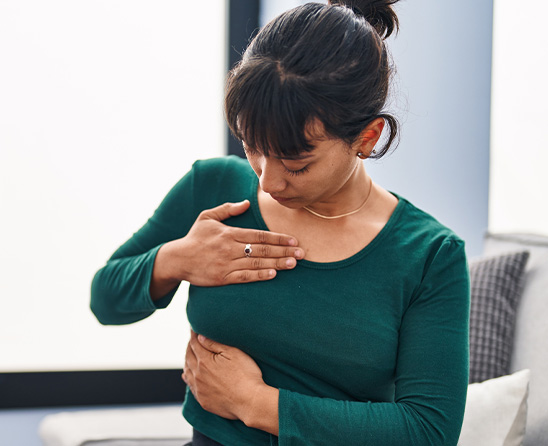Benign breast concerns can be described as changes or growths in the breast tissue that are not cancer. Because the symptoms of benign breast concerns can mimic those caused by breast cancer, many women are concerned when they first visit us regarding these changes. While any abnormal change in the breast should be assessed by a professional, many of these changes turn out to be benign. In fact, benign breast conditions are more common than breast cancer.
At Tucson Breast Health Specialists, we assess, diagnose, and treat the following benign breast concerns:
- Benign Breast Changes
- Idiopathic Granulomatous Mastitis
- Mastodynia
- Breast Abscess
- High-Risk Lesions and Level Risk
Contact Us Today
If you have any concerns regarding your breast health or breast cancer risk factors, please let us know. Contact Tucson Breast Health Specialists in Tucson, AZ today to schedule an appointment.
Benign Breast Concern FAQs
Are benign breast lumps dangerous?
Do benign breast lumps cause pain?
Why do benign breast tumors grow?
What do benign breast changes mean?
Can benign breast tumors turn malignant?

Benign Breast Changes
Learn More
Granulomatous Mastitis
Learn More
Mastodynia
Learn More
Breast Abcess
Learn More
High-Risk Lesions and Level Risk
Learn More“The level of care is excellent.”


CONTACT US
We are dedicated to providing the support you need. Contact us today to learn more about how we can help on your breast health journey.
We are only accepting patients with surgical breast diseases. We do not see patients for breast pain or without imaging in the last three months. If you have been diagnosed with one of the following, please submit the contact form or call our office at (520) 605-2778 to schedule your appointment.
- Breast cancer, DCIS (ductal carcinoma in situ), LCIS (lobular carcinoma in situ), invasive ductal carcinoma, invasive lobular carcinoma, and any other breast malignancies such as sarcoma, and malignant phyllodes
- Patients with known genetic mutations such as BRCA 1, 2, and others
- Fibroadenoma, phyllodes tumor, radial scar, complex sclerosing lesion, papilloma >8mm, atypical papilloma, nipple mass or ulceration,
- Granulomatous mastitis
- Atypical ductal or lobular hyperplasia ( ALH, ADH), and any benign lesion with atypia







